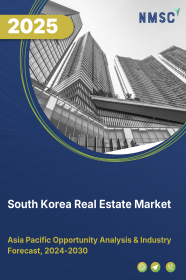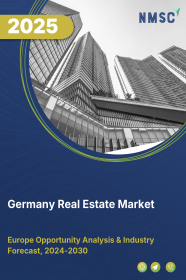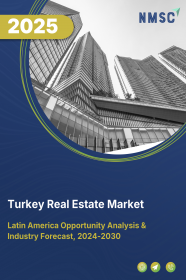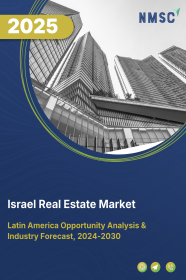
South Korea Real Estate Market by Property Type (Residential Buildings & Dwellings, Commercial Complexes, Industrial Infrastructure, and Government Infrastructure), and by Business (Sales, Rental, and Lease) – Opportunity Analysis and Industry Forecast, 2024–2030
Industry: Construction & Manufacturing | Publish Date: 25-Mar-2025 | No of Pages: 133 | No. of Tables: 99 | No. of Figures: 44 | Format: PDF | Report Code : CM1212
US Tariff Impact on South Korea Real Estate Market
Trump Tariffs Are Reshaping Global Business
Market Definition
The South Korea Real Estate Market size was valued at USD 306.2 million in 2023, and is predicted to reach USD 552.7 million by 2030, at a CAGR of 8.8% from 2024 to 2030.
The real estate industry constitutes a multifaceted market involving the acquisition, development, and management of residential and commercial properties. This expansive sector includes residential real estate, catering to individuals and families, as well as commercial and industrial real estate, focused on business operations and manufacturing. Real estate development involves the creation and enhancement of properties, while real estate investment encompasses acquiring properties for financial gain.
Additionally, a range of professional services, such as those provided by real estate agents and property managers, contributes to the industry's dynamics. Influenced by economic trends, demographic shifts, and regulatory factors, the real estate market is a complex landscape where various stakeholders engage in activities that shape urban environments, support economic growth, and provide investment opportunities.
Growing Integration of Online Property Platform Drives the Market Growth in the Region
An online property platform is a digital marketplace or website designed to streamline and enhance the real estate transaction process. These platforms serve as comprehensive hubs for property seekers and sellers, offering a wide array of property listings with detailed information, including location, size, amenities, and pricing. Users can efficiently search for properties using advanced filters, explore virtual tours, and view high-quality images.
These platforms often provide valuable market insights and trends, empowering users with information about the real estate landscape. Additionally, users can create accounts to save favourite listings, receive property alerts, and track their search history.
Increasing Need of Remote Work Over the Region is Propelling the Market Growth
The rise of remote work, fueled by technological advancements, has altered preferences for property locations, with a growing emphasis on a higher quality of life over proximity to traditional work centers. Smart home features, including automation systems and energy-efficient technologies, have become significant selling points, enhancing both the desirability and value of properties.
Online platforms have transformed the real estate landscape, offering virtual tours, streamlined transactions, and an abundance of information for buyers and sellers. Data analytics empowers real estate professionals with valuable insights into market trends, property values, and investment opportunities.
Environmental Concern is Significantly Restraining the Market Growth in the Region
Environmental concerns in the real estate industry pertain to the impact of construction and property development on the environment. As awareness of ecological issues increases, governments and communities may enact regulations that enforce eco-friendly construction practices.
This could include requirements for energy-efficient buildings, waste reduction, and sustainable materials. Implementing these measures may raise construction costs, affecting the overall profitability of real estate projects. Thus, investors and developers need to stay informed about evolving environmental standards and incorporate sustainable practices to navigate this restraining factor effectively.
Rising Smart City and Sustainable Development Projects Across the Region Create Ample Market Opportunities
The growing number of smart cities and sustainable development projects over the region is expected to provide ample opportunities in the real estate market in the coming years. These projects focus on creating eco-friendly, tech-savvy urban environments that enhance the quality of life.
As cities face issues of energy efficiency and infrastructure, the real estate sector benefits from constructing environmentally friendly, technologically advanced properties. This trend not only addresses pressing global challenges but also offers a promising future for real estate investors and developers to prosper in a world increasingly focused on sustainability and technology.
Competitive Landscape
The market players operating in the South Korea real estate market include Samsung C&T Corporation, Daewoo Engineering & Construction, Kye-Ryong Construction Industrial Co Ltd, Hoban Construction, Hyosung Corp, CBRE Korea, JLL Korea, ESR Kendall Square REIT, Korea Real Estate Investment & Trust Co., Ltd, HDC HOLDINGS CO.,Ltd, Cushman & Wakefield, Booyoung Group, Dongbu Corporation, Hines Interests Limited, Knight Frank.
South Korea Real Estate Market Key Segments
By Property Type
-
Residential Buildings & Dwellings
-
Commercial Complexes
-
Industrial Infrastructure
-
Government Infrastructure
By Business
-
Sales
-
Rental
-
Lease
Key Market Players:
-
Samsung C&T Corporation
-
Daewoo Engineering & Construction
-
Kye-Ryong Construction Industrial Co Ltd
-
Hoban Construction
-
Hyosung Corp
-
CBRE Korea
-
JLL Korea
-
ESR Kendall Square REIT
-
Korea Real Estate Investment & Trust Co., Ltd
-
HDC HOLDINGS CO.,Ltd
-
Cushman & Wakefield
-
Booyoung Group
-
Dongbu Corporation
-
Hines Interests Limited
-
Knight Frank
REPORT SCOPE AND SEGMENTATION:
|
Parameters |
Details |
|
Market Size in 2023 |
USD 306.2 Million |
|
Revenue Forecast in 2030 |
USD 552.7 Million |
|
Growth Rate |
CAGR of 8.8% from 2024 to 2030 |
|
Analysis Period |
2023–2030 |
|
Base Year Considered |
2023 |
|
Forecast Period |
2024–2030 |
|
Market Size Estimation |
Million (USD) |
|
Growth Factors |
|
|
Companies Profiled |
15 |
|
Market Share |
Available for 10 companies |
|
Customization Scope |
Free customization (equivalent up to 80 working hours of analysts) after purchase. Addition or alteration to country, regional, and segment scope. |
|
Pricing and Purchase Options |
Avail customized purchase options to meet your exact research needs. |

















 Speak to Our Analyst
Speak to Our Analyst

















